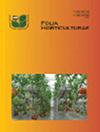通过诱导温和的盐度胁迫来提高水培新鲜芳香草本植物的质量是物种特异性的
IF 1.8
4区 农林科学
Q2 HORTICULTURE
引用次数: 3
摘要
摘要有利可图的水培生产需要高质量的淡水,而淡水通常无法用于农业,而盐水脱盐是一项昂贵且不可持续的技术。在本研究中,我们评估了漂浮系统中新鲜薄荷和留兰香无土栽培过程中轻度盐度胁迫对生物量产量、产品质量和植物次生代谢产物含量的影响。薄荷和留兰香植物在补充有三种不同NaCl浓度(0mM、10mM或20mM NaCl)的营养溶液(NS)上生长25天。记录植株高度、根长、鲜重和干重,并测定新鲜组织的成分。采用定向超高效液相色谱-质谱联用技术(UPLC-MS/MS)测定了精油和多酚类化合物的加氢蒸馏组成。除了在最高盐度水平下的株高外,在NS中添加NaCl不会暂停植物生长。薄荷的营养成分不受盐度的影响,而留兰香的营养成分显著改善,硝酸盐含量降低,总抗氧化能力、总可溶性酚、总类胡萝卜素和精油含量增加。同时,盐度对两种植物的精油或多酚组成没有影响。总之,即使在温和的盐度条件下,在漂浮系统中生产薄荷和留兰香也是可行的,不会对作物产量或植物的精油或酚类成分产生负面影响。事实上,低盐度水平改善了留兰香植物的营养成分。本文章由计算机程序翻译,如有差异,请以英文原文为准。
Improvement of the quality in hydroponically grown fresh aromatic herbs by inducing mild salinity stress is species-specific
Abstract Profitable hydroponic production requires high quality fresh water, which is often not available for agricultural use, while desalinisation of salty water is an expensive and unsustainable technology. In the present study, we assessed the effect of mild salinity stress during the soilless cultivation of fresh peppermint and spearmint in the floating system on biomass yield, produce quality and plant secondary metabolite content. Peppermint and spearmint plants were grown for 25 days on a nutrient solution (NS) supplemented with three different NaCl concentrations (0 mM, 10 mM or 20 mM NaCl). The plant height, root length, fresh and dry weight were recorded and composition was determined on fresh tissue. The composition of essential oil was determined upon hydrodistillation and that of polyphenolic compounds by targeted ultra-performance liquid chromatography coupled with mass spectrometer (UPLC-MS/MS). Plant growth was not suspended by the addition of NaCl in the NS, except for the plant height at the highest salinity level. In peppermint, the nutritional composition was not affected by the salinity, whereas it was significantly improved in spearmint as confirmed by the nitrate content decrease and the total antioxidant capacity, total soluble phenol, total carotenoid and essential oil content increases. Simultaneously, no effect of the salinity on essential oil or polyphenolic composition in both plants was induced. In conclusion, peppermint and spearmint production is feasible in the floating system even under mild salinity conditions, without negatively affecting either the crop yield or the plant's essential oil or phenolic composition. Indeed, low salinity levels improved the nutritional composition of spearmint plants.
求助全文
通过发布文献求助,成功后即可免费获取论文全文。
去求助
来源期刊

Folia Horticulturae
Agricultural and Biological Sciences-Horticulture
CiteScore
3.40
自引率
0.00%
发文量
13
审稿时长
16 weeks
期刊介绍:
Folia Horticulturae is an international, scientific journal published in English. It covers a broad research spectrum of aspects related to horticultural science that are of interest to a wide scientific community and have an impact on progress in both basic and applied research carried out with the use of horticultural crops and their products. The journal’s aim is to disseminate recent findings and serve as a forum for presenting views as well as for discussing important problems and prospects of modern horticulture, particularly in relation to sustainable production of high yield and quality of horticultural products, including their impact on human health.
 求助内容:
求助内容: 应助结果提醒方式:
应助结果提醒方式:


